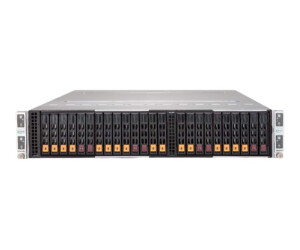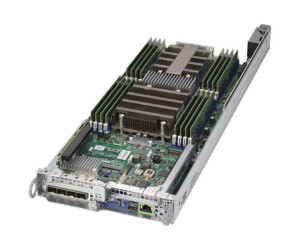The AMD EPYC is a series of high-performance processors specifically designed for use in servers and data centers. These CPUs offer an impressive combination of performance, efficiency, and scalability, and are designed to meet the demands of modern data-intensive workloads.
The AMD EPYC is based on AMD's Zen architecture and offers a variety of powerful features. One of the most notable features is the high number of cores and threads available in the processors. The EPYC processors are available in various configurations, starting from 8 cores and going up to an impressive 64 cores. This allows for tremendous parallel processing capability and supports the simultaneous execution of demanding tasks.
Another outstanding feature of the AMD EPYC is its support for multi-socket configurations. This means that multiple EPYC processors can work together in a single system to further enhance overall performance and scalability. By combining multiple processors, businesses can increase their computing power and storage capacity to handle the demands of highly loaded workloads such as databases, virtualization environments, and big data analytics.
Furthermore, the AMD EPYC features an advanced memory architecture. The processors support high memory capacity and bandwidth, which is advantageous for workloads with large amounts of data. The EPYC processors also support NVMe (Non-Volatile Memory Express) technology, which accelerates access to flash storage and improves the performance of data-intensive applications.
Security is another important feature of the AMD EPYC. The processors come with integrated security features that enhance the protection of sensitive data and applications. These features include functions like Secure Memory Encryption, which encrypts the contents of memory, and Secure Encrypted Virtualization, which secures virtual machines. These security features contribute to reducing security risks and ensuring data safety.
In addition to impressive performance and advanced features, the AMD EPYC also offers high energy efficiency. The processors are designed to deliver optimal performance per watt while minimizing energy consumption. This results in lower operating costs and a more environmentally friendly solution for data centers.
The AMD EPYC is used in a variety of applications, including cloud computing, virtualization, databases, high-performance computing, and more. Its powerful architecture, scalability, and security features make the AMD EPYC an attractive choice for businesses in need of a robust and reliable server solution.
The AMD EPYC stands out for several key features that make it a powerful and versatile server solution:
- High core and thread count: The AMD EPYC offers an impressive number of cores and threads, starting from 8 cores and going up to 64 cores per processor. This allows for simultaneous execution of demanding tasks and high parallel processing capability.
- Scalability: The EPYC supports multi-socket configurations, allowing multiple processors to be combined in a system. This enables businesses to scale their computing power and storage capacity significantly to meet their workload requirements.
- Advanced memory architecture: The AMD EPYC supports high memory capacity and bandwidth. This is particularly important for data-intensive workloads, as large amounts of data can be efficiently processed.
- Integrated security features: The EPYC has integrated security features that enhance the protection of sensitive data. These include Secure Memory Encryption and Secure Encrypted Virtualization.
- Energy efficiency: The AMD EPYC is designed to provide high performance per watt. By leveraging advanced technologies and optimizations, businesses can lower their operating costs and adopt a more environmentally friendly server solution.
- Support for modern technologies: The EPYC supports a range of modern technologies, including PCIe 4.0 and NVMe. This enables faster data transfer rates and improved storage performance.
- Application versatility: The AMD EPYC finds application in various domains, including cloud computing, virtualization, databases, artificial intelligence, and high-performance computing. The flexibility and performance of the EPYC make it an ideal choice for a wide range of workloads.
Advantages of the AMD EPYC:
- High Performance: The AMD EPYC offers impressive performance with a high number of cores and threads. This allows for efficient and fast execution of complex and compute-intensive tasks.
- Scalability: With support for multi-socket configurations, the EPYC allows for easy scalability of computing power and storage capacity. Businesses can flexibly adapt their server infrastructure to growing requirements.
- Large Memory Capacity: The EPYC supports high memory capacity, which is particularly important for data-intensive applications. By working with large datasets, businesses can perform extensive analyses and gain important insights.
- Integrated Security: AMD has incorporated extensive security features into the EPYC processor to ensure the protection of sensitive data. These features include Secure Memory Encryption and Secure Encrypted Virtualization.
- Energy Efficiency: The AMD EPYC is designed for high energy efficiency. By leveraging advanced technologies and optimizations, businesses can reduce their operating costs and adopt an environmentally friendly approach.
- Support for Modern Technologies: The EPYC supports a range of modern technologies, including PCIe 4.0 and NVMe, enabling faster data transfer rates and improved storage performance.
- Versatile Applications: The AMD EPYC finds application in various domains, including cloud computing, virtualization, databases, artificial intelligence, and high-performance computing. The flexibility and performance of the EPYC make it an ideal choice for a variety of workloads.
Disadvantages of the AMD EPYC:
- Price: The AMD EPYC may have a higher price compared to other server processors. Businesses need to carefully evaluate the cost-benefit trade-off to ensure that the EPYC meets their specific requirements.
- Compatibility: Although AMD continuously works on the compatibility of its processors, there may be instances where not all existing software applications and hardware components are fully compatible with the EPYC. It is important to verify compatibility with existing infrastructure before making a purchase.
- Market Acceptance: Intel has long been a dominant player in the server processor market. Therefore, there may be some reluctance from businesses to transition from established Intel processors to the AMD EPYC. However, the market acceptance of AMD EPYC is steadily growing.
- Single-Thread Performance: While the AMD EPYC offers excellent performance in multi-threaded applications, its single-thread performance may not be able to compete with some Intel processors. This can impact workloads that heavily rely on single threads.
The AMD EPYC offers high core count, scalability, advanced memory architecture, integrated security features, energy efficiency, and support for modern technologies. These characteristics make it an attractive choice for businesses in need of a powerful and reliable server solution. It is important for businesses to carefully evaluate their specific requirements and priorities before making a purchase, potentially seeking advice from experts to make the best decision. Overall, the AMD EPYC provides an impressive combination of performance, scalability, security, and energy efficiency. With its advanced features, it is a solid option for businesses looking to handle demanding workloads in their server environments.












